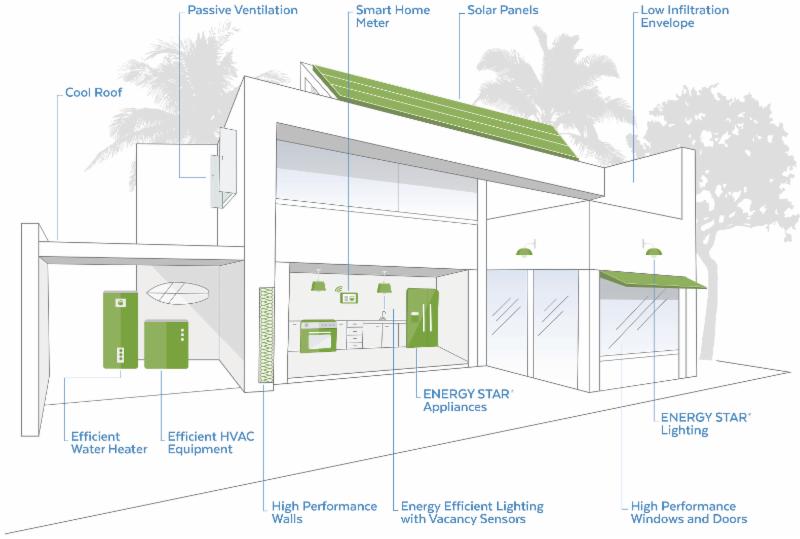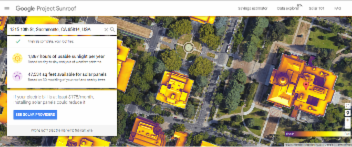Lancaster adopts new ZNE home ordinance that expands on solar requirements
"The City of Lancaster has always prided itself on being a City of firsts - we continue to do so as we pave the way in the sustainable energy sphere," said Mayor R. Rex Parris. Mayor Parris is referring to the new zero net energy home ordinance adopted by city leaders in January 2017, which mandates that all builders install a solar system equal to two watts per square foot for each new home built.
Read more about Lancaster's new ordinance
|
California legislation would require more than solar-ready roofs
Current California laws require new construction projects under 10 stories to be "solar ready," meaning they are built with 15% of the roof surface clear and unshaded to accommodate the addition of solar panels or solar thermal systems later in the building's life cycle. Senate Bill 71, new legislation introduced to the State Senate and modeled after recently implemented laws in San Francisco, would require the photovoltaic (PV) panels or thermal system to also be in place at the completion of the project.
Read more about this legislation
|
Decathlon program focuses on ZNE buildings
College teams from around the world are preparing for the upcoming Solar Decathlon in Denver, Colorado, this October. This year's projects will feature zero net energy dwellings-completely powered by solar generation resources--that are designed and constructed by 13 interdisciplinary college teams from the U.S. and internationally.
|
SFUSD honored with transformation award for pushing toward carbon neutrality
San Francisco Unified School District (SFUSD) has won the Transformation Award for its work setting goals to reach carbon neutrality by 2040.
The award was given by the Center for Green Schools and the
Green Schools National Network
(GSNN) during the recent Green Schools Conference and Expo, where the 2017 Best of Green Schools honorees were announced. The awards recognize and highlight significant sustainability efforts at schools across the country.
Read more about SFUSD's commitment to carbon neutrality
|
S
anta Monica to help builders with new residential ZNE guidance 
In conjunction with Santa Monica's reach code that passed in October 2016, the city has published the
Santa Monica Residential Zero Net Energy Guide for New Construction to assist future home owners, developers, and builders to construct their single family and low-rise residential buildings to ZNE standards. The guide is intended to help builders and homeowners understand what is required for design, construction and operation of these ultra-low energy residences. It
provides detailed steps on how to set goals, reduce energy loads, select efficient equipment, include renewable energy, and illustrate code performance through HERS verification and modeling.
|
Want solar? Let Google show you if your house has potential
 Google has now expanded its two-year-old Project Sunroof, which maps houses with sufficient sun exposure for solar panels to all 50 states. Originally covering only the San Francisco Bay Area, Fresno, and Boston, the map had limited appeal. But now a total of 60 million buildings have been added to the project's database. Project Sunroof uses imagery from Google Earth and Maps to assess how much sunlight each portion of each roof gets. Weather patterns, sun position changes, and possible shade from nearby buildings is taken into account, according to Google. Google has now expanded its two-year-old Project Sunroof, which maps houses with sufficient sun exposure for solar panels to all 50 states. Originally covering only the San Francisco Bay Area, Fresno, and Boston, the map had limited appeal. But now a total of 60 million buildings have been added to the project's database. Project Sunroof uses imagery from Google Earth and Maps to assess how much sunlight each portion of each roof gets. Weather patterns, sun position changes, and possible shade from nearby buildings is taken into account, according to Google.
|
|
Trainings help build knowledge and design capability that is driving ZNE in California
California has ambitious goals around zero net energy (ZNE) buildings and rightly so. Buildings account for roughly 40% of the carbon emissions in the United States. In order to help policymakers develop ZNE ordinances, building owners to understand the benefits of these ultra-low energy projects, and design teams to successfully achieve ZNE performance, NBI is working with the California Public Utilities Commission and the state investor-owned utilities to offer a series of workshops in 2017.
With a special emphasis on addressing the existing building stock, six workshops on achieving zero net energy in
existing buildings will be held. Four specialized workshops for schools and two addressing how building portfolio managers can improve their own building stock and catalyze action on privately owned existing buildings with in their jurisdictions.
Local government representatives will have two opportunities to gain understanding on how to achieve climate goals through municipal building benchmarking and portfolio analysis, ZNE pilot projects, encouraging ZNE market leadership through recognition, ZNE codes and polices, financial incentives, and other tactics.
|
California's Commercial ZNE Action Plan update is underway
The California Public Utilities Commission (CPUC) is kicking off the Commercial ZNE Action Plan which was last updated in 2011. This process will result in the next steps to move ZNE commercial buildings forward across California with input across stakeholder groups, and includes six key drivers to be addressed. Stakeholders will meet at CPUC offices on June 5 to begin a review of the residential plan in the morning and address the commercial plan in the afternoon.
Read more
|
To help create ZNE leadership in the public sector and advance adoption of ZNE in the market, the CPUC asked New Buildings Institute (NBI) to convene a group of public sector "Early Adopters" to develop strategies that will lead to successful ZNE projects. This leadership group is now a LinkedIn group,
join now and get frequent updates on California ZNE information.
|
|
Upcoming events:
June 13 | 1 PM - 5 PM
Doubletree Hotel
2233 Ventura Street, Fresno, CA
June 24-28
Hyatt Regency Long Beach
200 S Pine Ave, Long Beach, CA
August 23 | 1 PM - 5 PM
Net Zero Plus Electrical Training Institute
6023 S. Garfield, Avenue, Commerce, CA
August 24 |
7:00 AM - 5:00 PM
IBEW Net Zero Plus Facility
6023 Garfield Ave, Commerce, CA
|
Salesforce met a 2050 commitment to becoming a zero carbon emissions company 33 years earlier than the target date. Analysis of energy related emissions have pushed the company to increase efficiency across all business operations. These efficiency measures along with purchasing carbon credits have helped them achieve this milestone ahead of schedule
Read more
|
Local Government Resources for Municipal ZNE
The Statewide Energy Efficiency Collaborative has compiled resources for ZNE policy implementation for municipal jurisdictions.The ZNE Hub will serve as a live resource and will continue to be updated as new policies, funding opportunities, and resources are developed.
|
|
|
|
Energy Upgrade California™ is a state initiative to educate residents and small business consumers about energy management. The initiative helps Californians take action to save energy and conserve natural resources, reduce demand on the electricity grid, and make informed energy management choices at home and at work. It is supported by an alliance of the California Public Utilities Commission, the California Energy Commission, utilities, regional energy networks, local governments, businesses, and nonprofits to help communities meet state and local energy and climate action goals. Funding comes from investor-owned utility customers under the auspices of the California Public Utilities Commission. ©2013 Energy Upgrade California. Trademarks are property of their respective owners. All rights reserved.
|
We look forward to hearing about your ZNE efforts. If you want to get the word out on related upcoming ZNE events, new research, buildings or other ZNE Action Plan news, please send info to Connie Umphress at
[email protected]

|
|
|
|
|